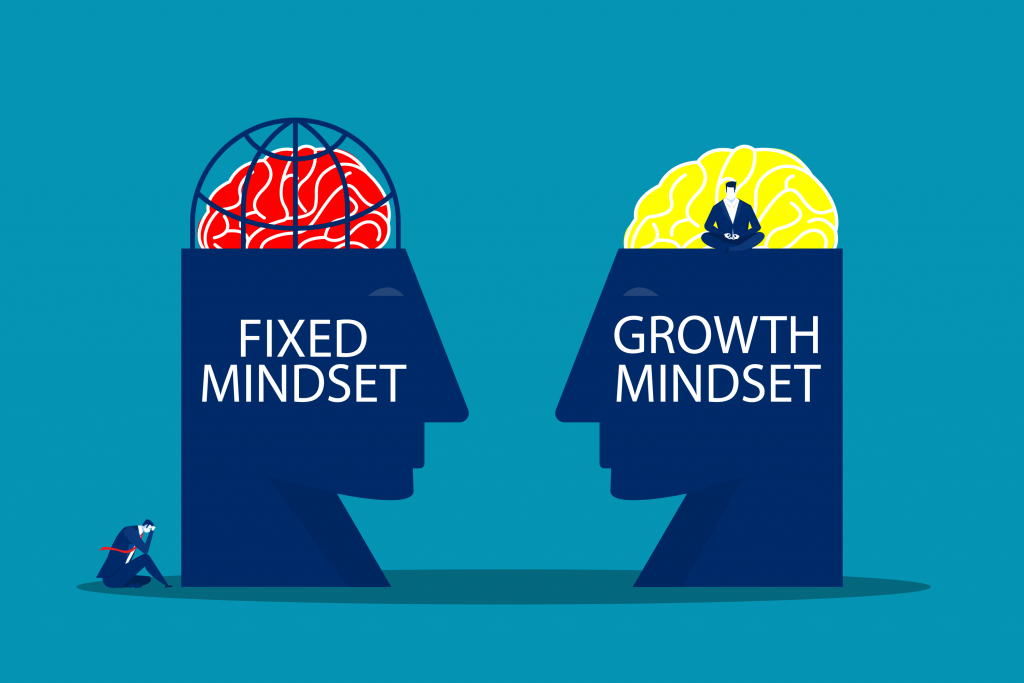A Choice to Learn and Grow
When we are sitting in classrooms as students, trying to pay attention to what we’re being taught, we very rarely think about how this particular lesson will translate into our future life and potential careers. We are just thinking; this is the hurdle before us that we now have to overcome. We’re not sure why, but hopefully, we’ll be better for it. In this sense, we never acknowledge the mindset needed to make use of the lessons we learned and grow from them so that we not only become better student learners but better people. People who overcome barriers with resilience and perseverance. This is what we call a growth mindset. A growth mindset entails dedication and the belief that our basic abilities can be developed through persistence and hard work. Sounds simple enough, but its implementation is predicated on discipline and an awareness of our skills and what motivates us. (Schrader, 2019)
Growth Mindset Versus Fixed Mindset
What differentiates a growth mindset and a fixed mindset is the willingness to grow. If you believe you were born and raised with a fixed set of skills and abilities that stick with you for life, you may exhibit a ‘fixed’ mindset. The issue is that most people with this mindset shy away from challenges out of fear of feeling embarrassed or humiliated in front of others. To be fair, who does enjoy those feelings? However, as Stanford psychology professor Carol Dweck puts it, “For some people, failure is the end of the world—but for others, it’s this exciting new opportunity.”(2003)
To develop that growth mindset, it is important to disassociate happiness and performance. You have to expect that hurdles and setbacks are commonplace, and although it may not seem like it at the time, these mistakes don’t define who you are as a person. Every experience is an opportunity to learn and grow.
It’s important to understand that expectations will not always match results. A study carried out by Levine et al. (2012) revealed that when asked to rate their expected happiness levels before and after a test, most students thought they would be happier if they got higher grades on the test and sadder if they got lower grades on the test. The outcome revealed that there were virtually no differences in the happiness
ratings after the results of the test. What we see is that we focus too much time on things that do not matter, and it starts to affect our capacity to learn. Now, of course, grades are an essential evaluation tool, but using extrinsic factors like grades as a primary tool to assess happiness and success levels can undermine the intrinsic
motivator that led students to learn the subject matter in the first place. What we are doing is teaching students how to study to do well on tests, not necessarily learning the subject matter.

With a fixed mindset, we will believe that good performance will come naturally, whereas individuals with a growth mindset will tell you that optimal performance takes hard work. A study carried out on pre-med students by Dweck and Grant (2003) revealed that similar to the happiness scale, students with a fixed mindset worried more about their grades and, as a result, lost confidence at the sight of adversity. This contrasted with students with a growth mindset who were focused on actually learning the material and, if they did poorly, used it as an opportunity to improve. What we saw was that students who exhibited a growth mindset didn’t suffer from a decreased level of intrinsic motivator, as stated before, they used it as an opportunity to grow and eventually scored higher overall in the end. In contrast, students with a fixed mindset only had good grades if that was the expectation, but if there was a drop in performance, it amounted to an extreme drop.
The same effect occurs in the professional field as well. Companies that embrace a growth mindset reported a feeling of empowerment and commitment from their employees, who also claimed they felt more organizational support for collaboration and innovation. However, people at primarily fixed-mindset companies reported more deception and infighting among employees, trying to gain an advantage in the workforce(HBR, 2014).
Growth Mindset Misconception
There are common misconceptions that should be mentioned when describing a growth mindset. People tend to associate the concept with having a positive outlook or open-mindedness, qualities they already have. People also think it is just a system of praise and rewarding effort. However, as Dweck(2016) describes, a pure growth mindset doesn’t exist. Everyone is made up of a mixture of fixed and growth mindsets. What matters is the level of effort we put in and that we reward not just effort but also learning and progress, and emphasize the processes that yield these things, such as seeking help from others, trying new strategies, and capitalizing on setbacks to move forward effectively.
Read more articles on Zealousness blog on personal development and self-actualization Personal Development – iN Education Inc. (ineducationonline.org)
References:
- Dweck, Carol. “What Having a ‘Growth Mindset’ Actually Means.” Harvard Business Review, 2016. https://hbr.org/2016/01/what-having-a-growth-mindset-actually-means.
- Grant, H., & Dweck, C. S. “Clarifying Achievement Goals and Their Impact.” Journal of Personality and Social Psychology, 85(3), 541–553. (2003) https://doi.org/10.1037/0022-3514.85.3.541
- Harvard Business Review(HBR) “How Companies Can Profit from a ‘Growth Mindset.’” Harvard Business Review, 2014. https://hbr.org/2014/11/how-companies-can-profit-from-a-growth-mindset.
- Levine, Linda J., Heather C. Lench, Robin L. Kaplan, and Martin A. Safer. “Accuracy and Artifact: Reexamining The Intensity Bias in Affective Forecasting.” Journal of Personality and Social Psychology 103, no. 4 (2012): 584–605. https://doi.org/10.1037/a0029544.
- Schrader, Jessica. “15 Ways to Build a Growth Mindset.” Psychology Today. Sussex Publishers, April 2019. https://www.psychologytoday.com/ca/blog/click-here-happiness/201904/15-ways-build-growth-mindset.























